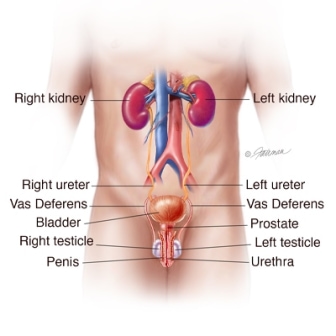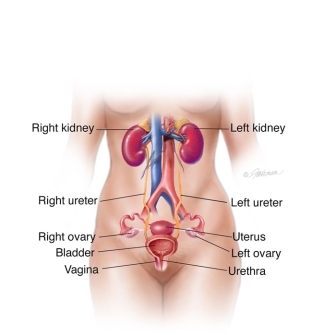Boys and girls with WAGR syndrome frequently have abnormalities of the genitals and/or the urinary tract. These abnormalities occur before birth, and are thought to be the result of deletion of one copy of the WT1 gene.
Boys with WAGR syndrome may have problems with the testicles or penis. Girls with WAGR syndrome may have internal genital abnormalities of the vagina, uterus or ovaries. Both sexes may have structural abnormalities of the kidneys or ureters.
In some cases, problems with development of the genitals may be severe enough to make sexual assignment (male or female) at birth difficult.
In all cases, appropriate diagnosis and treatment of genitourinary abnormalities can improve health and quality of life.
About sixty percent of boys with WAGR syndrome have abnormalities of the genitals. These may include:
Referral to a urologist (a doctor who specializes in treatment of disorders of the genitourinary tract) is important for diagnosis and treatment of these conditions.

Male Genitourinary Tract

Female Genitourinary Tract
Problems with the genitals in girls with WAGR syndrome may not be diagnosed at birth because some female genital organs are internal. It is important to be aware that girls with WAGR syndrome may have:
Streak ovaries may increase the risk for a type of cancer called gonadoblastoma, and should be monitored regularly. This monitoring may include pelvic ultrasound or MRI and/or laboratory tests.
Small ovaries may not function properly. There may be problems with development of secondary sex characteristics (puberty), with menstruation or both. Consultation with both a gynecologist and an endocrinologist (doctor who specializes in treatment of disorders of the endocrine system) may be helpful for diagnosis and treatment of these conditions.
In both sexes, problems with the urinary tract may include:
In some newborns with WAGR syndrome, problems with the development of the genitals may make sexual assignment at birth (male or female) difficult. This can be very troublesome for families, and parents often feel confused and alone.
It is important to know that you and your child are not alone. A team approach including parents and pediatric specialists in urology, surgery, genetics, and endocrinology, can be helpful. Other families in the International WAGR Syndrome Association can also provide support and encouragement.
The International WAGR Syndrome Association is working to stimulate research
Sign up for News & Events
COPYRIGHT© 2025 IWSA / International WAGR Syndrome Association
